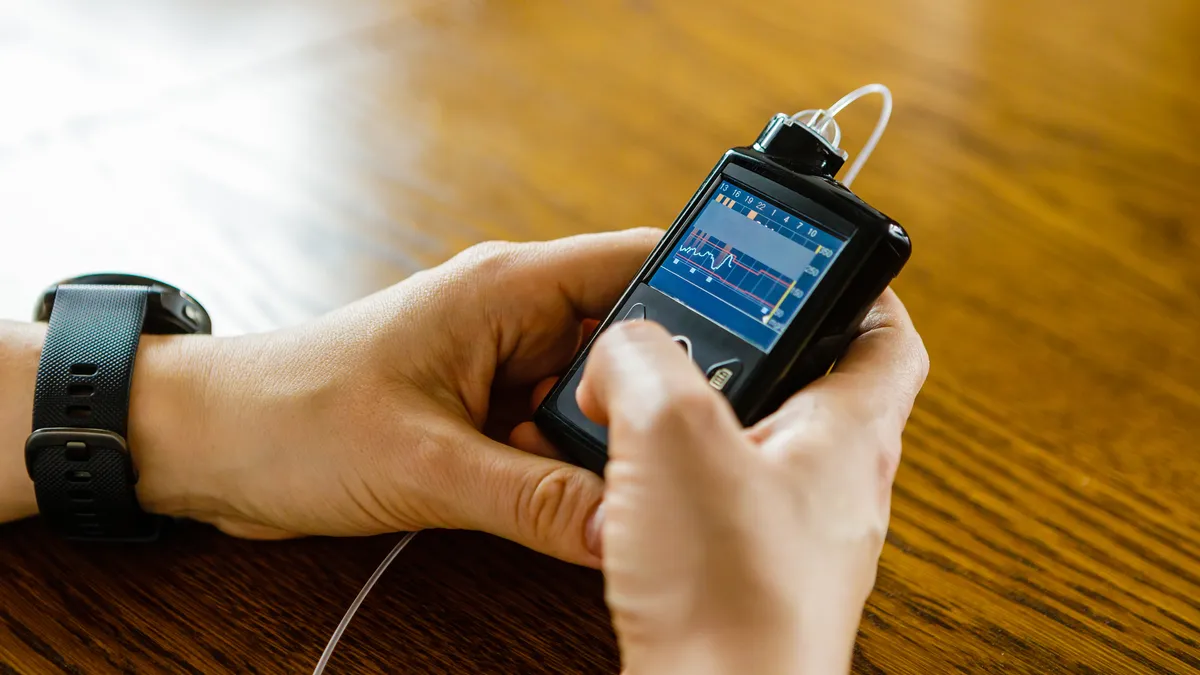Insulin pump-makers face questions about whether a new category of weight loss drugs will affect their long-term growth prospects.
Companies including Insulet and Tandem Diabetes Care saw their stock prices fall after a small study showed that GLP-1 agonists — which include the branded drugs Ozempic, Wegovy and Mounjaro — allowed people with Type 1 diabetes to reduce or stop insulin injections.
Shares of Insulet have declined 22% in the last month to $173.90, and shares of Tandem have declined 20% to $23.14.
However, physicians surveyed by analysts were skeptical the drugs would change the long-term outlook for diabetes, noting that the study only included 10 patients who started GLP-1s within three months of being diagnosed.
William Blair analyst Margaret Kaczor cited interviews with three physicians, including Insulet Medical Director Trang Ly, who all said there was no evidence GLP-1s reverse damage to the insulin-producing beta cells in the pancreas.
“As a result, while the latest generation of these drugs may delay progression, they do not believe that the drugs will meaningfully change the long-term outlook for diabetes,” she said in a research note.
The experts also mentioned that weight loss is not the only factor that affects the progression of diabetes — genetics and environment can also have an impact. Additionally, the cost of the drugs, at more than $1,000 per month, and adverse side effects cause nearly half of people taking GLP-1s to stop within one year, Kaczor wrote.
Osama Hamdy, an associate professor of medicine at Harvard Medical School, expects only a moderate effect on how many of his patients will take insulin in the future, BTIG analyst Marie Thibault wrote in a research note. She described Hamdy as a “believer in diabetes tech” and a “frequent prescriber of the GLP-1 receptor agonists.”
Currently, about a third of Hamdy’s patients take insulin, but the physician expects that number could decline to 20% to 25% in the next five years, Thibault said.
“Given the low, single-digit penetration of pumps in the T2D intensive insulin therapy (IIT) population, the potential impact to the insulin pump [total addressable market] looks relatively minor to us,” she wrote. “This expert is very positive on GLP-1s, but sees several remaining barriers to entry, including compliance, side effects, and insurer coverage.”
Pump-makers unfazed by GLP-1s
Medical device companies seemed similarly unfazed by the new class of drugs, despite earnings calls being peppered by questions about GLP-1s.
Insulet CEO Jim Hollingshead said in an August call with investors that he was confident the latest generation of GLP-1s wouldn’t affect Insulet’s total addressable market, citing rising diabetes cases worldwide. In the U.S., about 2.5 million people with Type 2 diabetes take multiple shots of insulin daily, and the percentage of people in that market who use insulin pumps is in the single digits.
“And so we’re just scratching the surface of that market,” Hollingshead said.
He also pointed to results of a recent feasibility trial of the company’s Omnipod 5 pump for people with Type 2 diabetes, where nearly half of enrollees were taking both GLP-1s and insulin.
Medtronic CEO Geoff Martha also said the company expects no impact in Type 1 diabetes, which makes up the majority of the company’s $2.3 billion diabetes business.
“Overall, I just don't see GLP-1s having a material impact on our business and medical device therapies at large,” he said in a late August earnings call.
Tandem did not face any questions about GLP-1s in an investor call it hosted in early August. The main challenge the company faces as it introduces its new, smaller pump called Mobi is competition as Insulet and Medtronic also launch new devices.
CEO John Sheridan said the company has only experienced competing with some of the new pump entrants, but still sees a “meaningful” long-term opportunity outside of the U.S.











